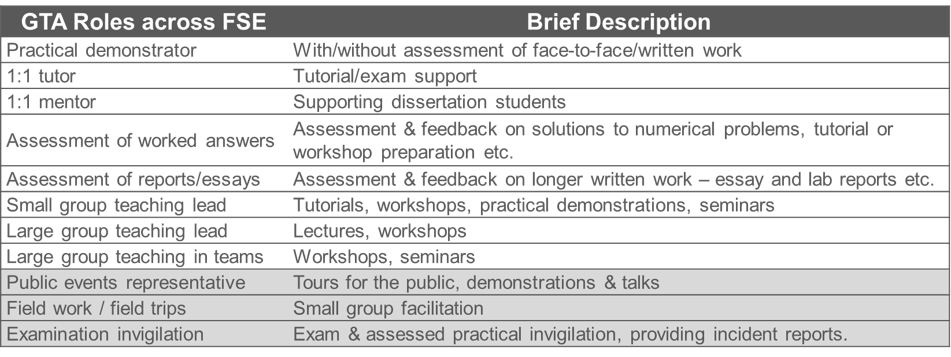
Training Courses
In 2016 Dr Thomas Rodgers (Chemical Engineering) and Dr Jenny Slaughter (Chemistry) identified complaints from students and staff about the quality of GTAs, so developed two training sessions (Expectations and Maring/Feedback) to address these issues.
These sessions proved sucessful and in 2017 they were expanded into six training sessions to cover the full range of roles undertaken by GTAs within the Faculty of Science and Engineering, as below:

Greyed out boxes are not within scope of the GTA training as these activities are looked after by different teams.
The six training modules are shown in the table below. This shows the general content of the training sessions provided as well as their mapping to both the UKPSF and the RDF. Each course has an online component and a live workshop session to build on the online information. There are also suggestions for your reflection on the material which you can use to build your application for AFHEA through the mentored route, and training that should be provided by your department as it is specific to your position.
|
Module |
Alignment with Professional Standards |
FSE GTA Training Modules |
Recommended Department Training |
|||
|
UKPSF |
RDF |
Online theory component |
Workshop sessions |
Post session |
||
|
Learning Outcomes & Lesson Plans |
A1, A2 K2 |
A1, A3 B2 |
Teaching
& learning theories How
students learn Preparing
for teaching Biology
of learning |
Interpreting
learning outcomes Constructive
alignment Levels
of Knowledge Planning
a teaching activity |
Own
philosophy of T&L Teaching
session plan |
Assigned role Receive school information |
|
Roles and Expectations |
A2, A4 K2 |
B1 D1 |
Diversity
of role Expectations
of institute, department & course leader Expectations
of students |
Scenario
based activities on: · Professionalism · How conflict can arise · Recognising problems |
Teaching
& learning “risk assessment” & questions to raise with School |
Shadow teaching session Introduction to logistics of course |
|
Professional Practice |
A4 V1, V2 |
A2, B1, C1, D1, D2 |
Unconscious
bias Equality
& diversity Data
protection General
Safety |
How
do you interact and teach others |
Safety training & risk assessment (local
procedures) |
|
|
Small Group Teaching Skills |
K2, K3, K4 |
A1 B1, B2 |
What
makes a good teaching session Team
teaching |
Forming,
Norming, Storming, and Adjourning Engaging
diverse learners |
Plan
for questioning in teaching Thinking about facilitation |
Using specific kit/software Specific learning outcomes |
|
Marking and Feedback |
A3, K3, K5 |
A1, B2, C1, D1, D2 |
Why
and how we assess learners Planning
for successful feedback |
Using
a rubric Team
marking Providing
constructive feedback |
Plan
for feedback in teaching |
Example marking on actual assessment |
|
eTeaching Tools |
K3, K5 |
A1 |
Course
structures in Blackboard Electronic
submission & marking Teaching
online (e.g. Zoom) |
Analysis
of e-Learning in own teaching |
Discussion with course leader on eLearning within
course |
|